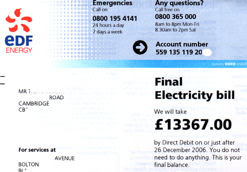On the UK government "Act on CO2" website there is clear advice, which no one would disagree with: Don't leave it on standby
"If everyone in the UK switched off unused appliances it would save £800 million a year. Leaving appliances plugged in and switched on at the socket means they're still using energy – so turn TVs, games consoles and mobile phone chargers off at the mains to save yourself money."
This is self evident advice and easy to implement. Why would any one question it? Turning something off that you don't need will save energy and save the planet. But is it always true?
Here is a simple quiz question for all you energy gurus out there:
I go out for the evening and despite my usual vigilance I leave my phone charger switched on, my TV on standby, and (horror of horrors) an electric light on. The room is heated (it is winter) by an electric heater, which has a thermostat. So here is the question, does leaving the electrical devices on unnecessarily:
- Use extra energy, contributing to my carbon footprint?
- Make absolutely no difference to my energy consumption, but increase my carbon footprint?
- Increase my energy consumption by the wattage of the devices left on, but make no difference to my carbon footprint?
- Make no difference to either my energy consumption or my carbon footprint?
- I need more information and need to thermally model your home and the insulation system on a computer before I can say.
So here is the surprise (for some people). If you want to be pedantic and very accurate, the answer is (5), but to a very close approximation, the answer is (4). The reason? Let me go over some very simple physics.
All these electrical devices convert the energy they use into heat (I'm assuming that the phone is not plugged into the charger so we are not converting any mains electrical energy into battery energy). Actually, conversion of electrical energy into heat energy happens at 100% efficiency for almost all electrical devices. The electric heater does the same. The thermostat on the heater does not know if the heat delivered to your room is from the heater or the other devices; it is all just heat. So whilst you are heating the room, the job of the thermostat is to maintain the room at a particular temperature. Everything else being equal, it will turn on the heater for slightly smaller periods of time to exactly compensate for the heat generated by the offending devices. The energy you use will be whatever is necessary to maintain the temperature difference between the outside and the chosen thermostat temperature inside. Which electrical device generates that heat does not matter. Obviously the thermal installation makes a massive difference and air flow from the outside through your room (a draft) is probably even more important. But the TV on standby makes no difference at all.
So why might answer (5) be important. We let us suppose that the phone charger is on the window sill, behind the curtains. It might then lose the heat it generates without contributing so much to the heating of the room. There would then be an argument for switching it off to save energy. I mention this only because there will be people who spot this and then claim that my argument is completely wrong. I will let you judge, on this.
Don't be complacent if you are in a hot climate with air conditioning running. Unfortunately the physics works the other way around in this case. Because air conditioning uses more energy than it shifts, the extra devices in your home now get multiplied by the efficiency of the air conditioning. A TV on standby using five watts now needs, maybe, another 5 watts of air conditioning to keep the room at the same thermostatically controlled temperature. And this will increase both your energy costs and your carbon footprint.
